Boakye Spinal Cord Injury Lab
Our Mission
To create imaginative therapies and make groundbreaking discoveries in research in neurophysiology, neuroimaging, neurobiology, neuroplasticity, neuromodulation, and biology of spinal cord injury systems and networks in order to cure paralysis, end pain and suffering, and make a lasting difference in the health and quality of life for patients with spinal cord injury.
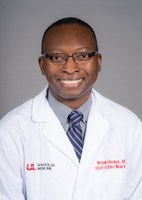 Principal Investigator
Principal Investigator
Maxwell Boakye, MD, MPH, MBA, FACS, is a professor and Ole A., Mabel Wise & Wilma Wise Nelson Endowed Chair, Chief of Spinal Neurosurgery, Clinical Director of the Kentucky Spinal Cord Injury Center, and Director of the spine fellowship at the University of Louisville. A neurosurgeon-scientist with approximately 50% devoted effort to research, Dr. Boakye has had a long-standing interest in spinal cord injury research. As Assistant Professor and Director of the Standford Neural Plasticity lab in Palo alto from 2003 to 2010 and presently the Director of the University of Louisville Spinal Cord Injury Lab since 2011.
Our Approach
Spinal cord injury (SCI) is a systematic disease affecting multiple systems. Our goals are to holistically restore or improve the multiple interrelated systems after SCI using multimodal and combinatorial approaches to restore paralysis and reduce or reverse derangements in systems including locomotor, bowel, bladder, cardiovascular regulation, inflammation, and metabolic function. We employ neuromodulatory approaches because they target multiple systems and can be used alone or in combination with other promising therapies e.g. neuroprotective, neuroregenerative agents. Much of our neuromodulatory animal research is done using the Yucatan minipig which has high translational value given the large spinal cord size, a greater CSF/cord ration, and physiologic and neuroanatomic similarities to the human spinal cord. A goal of the lab is to develop multimodal approaches including novel neuroimaging, electrophyiology, neuromodulatory strategies that can be used to address fundamental questions in SCI research, and overcome barriers to understanding neurophysiology and neuroplasticity of neuronal networks and design neurorestorative therapies to prevent or reverse systemic derangements.
Human SCI Neuromodulation program is a collaboration with Dr. Susan Harkema and Dr. Claudia Angeli. The goal of this collaboration is to develop neuromodulatory treatments for patients with acute or chronic SCI.
In 2011, Dr. Harkema successfully used intraoperative mapping to target key sensorimotor networks controlling voluntary movement and determined postoperative electrode configurations that enabled voluntary movement in a chronically paralyzed patient. Subsequently, our team showed spinal cord epidural stimulation (scES) enabled over-ground ambulation in two previously motor complete SCI patients. These groundbreaking discoveries have now been confirmed in many other labs and are the focus of our neuromodulation research program. The goals of our human neuromodulation research program include:
- To improve the current technology for epidural stimulation
- To develop techniques for activation and seamless integration of multiple physiological systems
- To understand the mechanisms of epidural stimulation
- To improve surgical techniques and safety of epidural stimulation
- To develop algorithms to improve the results of epidural neuromodulation to achieve ambulatory function in all patients in an efficient and rapid fashion
- To understand and quantify the range of benefits of scES on multiple physiological systems
- To obtain regulatory approval for scES and understand the role of scES in armamentarium of treatments for SCI
- To compare epistim to other emerging neuromodulatory technologies
- To combine epidural stimulation with other therapies for SCI
Co-investigators, Collaborators, & Consultants
Biostatistics
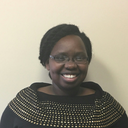 Beatrice Ugiliweneza, Ph.D., MSPH has expertise in health data science and analytics with over 15 years of experience in study design, analysis, reporting and dissemination. Her work spans interventional and observational studies, supervised and unsurpervised analytical algorithms, technical and laymen report summarization of the results. She also has extensive teaching experience in theoretical and applied analytics. Her research interests include health outcomes, health services research, health economics and health analytics.
Beatrice Ugiliweneza, Ph.D., MSPH has expertise in health data science and analytics with over 15 years of experience in study design, analysis, reporting and dissemination. Her work spans interventional and observational studies, supervised and unsurpervised analytical algorithms, technical and laymen report summarization of the results. She also has extensive teaching experience in theoretical and applied analytics. Her research interests include health outcomes, health services research, health economics and health analytics.
Motor Systems
 Dena R. Howland, Ph.D., Associate Professor, Department of Neurological Surgery and Rebecca F. Hammond Endowed Chair of Spinal Cord Injury Research Laboratory of Neural Repair, Plasticity and Functional Recovery research focuses on understanding the response of the spinal cord to injury and identifying approaches to enhance repair, plasticity, and motor recovery. Dr. Howland is an affiliate faculty in the Department of Anatomical Sciences and Neurobiology and the Department of Bioengineering. A research career scientist of rehabilitation for VAMC and Scientific Director of the Kosair Charities Center of Excellence in Pediatric NeuroRecovery at the University of Louisville, she joined the UofL faculty in 2012. Learn more about Dr. Howland's work here.
Dena R. Howland, Ph.D., Associate Professor, Department of Neurological Surgery and Rebecca F. Hammond Endowed Chair of Spinal Cord Injury Research Laboratory of Neural Repair, Plasticity and Functional Recovery research focuses on understanding the response of the spinal cord to injury and identifying approaches to enhance repair, plasticity, and motor recovery. Dr. Howland is an affiliate faculty in the Department of Anatomical Sciences and Neurobiology and the Department of Bioengineering. A research career scientist of rehabilitation for VAMC and Scientific Director of the Kosair Charities Center of Excellence in Pediatric NeuroRecovery at the University of Louisville, she joined the UofL faculty in 2012. Learn more about Dr. Howland's work here.
 David Magnuson, Ph.D., Friends for Michael Endowed Professor, Departments of Neurological Surgery, Anatomical Sciences & Neurobiology, and Biomedical Engineering. Dr. Magnuson joined the University of Louisville as an assistant professor in the Department of Neurological Surgery in 1995 and has since been promoted to professor and Friends for Michael Chair in Spinal Cord Injury Research. He holds joint/adjunct appointments in the Department of Anatomical Sciences and Neurobiology and in the Department of Biomedical Engineering. As a team member of the Kentucky Spinal Cord Injury Research Center (KSCIRC), he runs the Laboratory of Locomotor Systems and Rehabilitation and directs both KSCIRC’s Electrophysiology and Behavioral Assessment Core and Surgery and Animal Care Core. Learn more about Dr. Magnuson's work here.
David Magnuson, Ph.D., Friends for Michael Endowed Professor, Departments of Neurological Surgery, Anatomical Sciences & Neurobiology, and Biomedical Engineering. Dr. Magnuson joined the University of Louisville as an assistant professor in the Department of Neurological Surgery in 1995 and has since been promoted to professor and Friends for Michael Chair in Spinal Cord Injury Research. He holds joint/adjunct appointments in the Department of Anatomical Sciences and Neurobiology and in the Department of Biomedical Engineering. As a team member of the Kentucky Spinal Cord Injury Research Center (KSCIRC), he runs the Laboratory of Locomotor Systems and Rehabilitation and directs both KSCIRC’s Electrophysiology and Behavioral Assessment Core and Surgery and Animal Care Core. Learn more about Dr. Magnuson's work here.
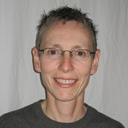 Gina Bertocci, Ph.D., is currently Professor and Endowed Chair of Biomechanics in the Department of Bioengineering at the University of Louisville. Dr. Bertocci has a BS and MS in Mechanical Engineering, and a PhD in Bioengineering - all from the University of Pittsburgh. She is also a licensed Professional Engineer. Learn more about Dr. Bertocci's work here.
Gina Bertocci, Ph.D., is currently Professor and Endowed Chair of Biomechanics in the Department of Bioengineering at the University of Louisville. Dr. Bertocci has a BS and MS in Mechanical Engineering, and a PhD in Bioengineering - all from the University of Pittsburgh. She is also a licensed Professional Engineer. Learn more about Dr. Bertocci's work here.
 David M. Rouffet, Ph.D., joined the University of Louisville Department of Neurological Surgery and Kentucky Spinal Cord Injury Research Center in 2018 as an Assistant Professor in Translational Research. He comes to UofL with an extensive background and body of work which includes multiple peer-reviewed research articles, reviews in international journals, as well as an impressive list of teaching appointments. Dr. Rouffet completed his PhD in Faculty of Sport and Exercise Sciences from the University of Lyon in France. Prior to that, he studied at the University of Clermont-Ferrand to complete both his Master's Degree and Bachelor's, also in France.
David M. Rouffet, Ph.D., joined the University of Louisville Department of Neurological Surgery and Kentucky Spinal Cord Injury Research Center in 2018 as an Assistant Professor in Translational Research. He comes to UofL with an extensive background and body of work which includes multiple peer-reviewed research articles, reviews in international journals, as well as an impressive list of teaching appointments. Dr. Rouffet completed his PhD in Faculty of Sport and Exercise Sciences from the University of Lyon in France. Prior to that, he studied at the University of Clermont-Ferrand to complete both his Master's Degree and Bachelor's, also in France.
Bladder & Bowel
 Charles Hubscher, Ph.D., has research which involves a multidisciplinary approach directed toward (i) understanding the neural mechanisms involved in the control/coordination of male and female urogenital functions, with a current emphasis on bladder, bowel and sexual dysfunction following chronic spinal cord injury and (ii) understanding the central neural mechanisms underlying the development and perpetuation of chronic pain, with an emphasis on spinal cord injury-related pains and pelvic/visceral pain. Translational studies involve experiments being done in parallel using a clinically relevant spinal contusion rodent model and studies of urogenital and bowel function in human research participants with complete or incomplete spinal cord injuries. Combinations of electrophysiological, behavioral, immunohistochemical and neuroanatomical techniques are being used in Dr. Hubscher’s animal laboratory. Learn more about Dr. Hubscher's work here.
Charles Hubscher, Ph.D., has research which involves a multidisciplinary approach directed toward (i) understanding the neural mechanisms involved in the control/coordination of male and female urogenital functions, with a current emphasis on bladder, bowel and sexual dysfunction following chronic spinal cord injury and (ii) understanding the central neural mechanisms underlying the development and perpetuation of chronic pain, with an emphasis on spinal cord injury-related pains and pelvic/visceral pain. Translational studies involve experiments being done in parallel using a clinically relevant spinal contusion rodent model and studies of urogenital and bowel function in human research participants with complete or incomplete spinal cord injuries. Combinations of electrophysiological, behavioral, immunohistochemical and neuroanatomical techniques are being used in Dr. Hubscher’s animal laboratory. Learn more about Dr. Hubscher's work here.
Neuroimaging
 Robert Bert, M.D., Ph.D., Associate Professor in the University of Louisville Department of Radiology received both his PhD and MD degrees from the University of Illinois-Urbana with a concentration in Neurosciences. With a special interest in Neuroradiology, Dr. Bert practices medicine and is active in research at the University of Louisville School of Medicine and UofL Health.
Robert Bert, M.D., Ph.D., Associate Professor in the University of Louisville Department of Radiology received both his PhD and MD degrees from the University of Illinois-Urbana with a concentration in Neurosciences. With a special interest in Neuroradiology, Dr. Bert practices medicine and is active in research at the University of Louisville School of Medicine and UofL Health.
 Junqian (Gordon) Xu, Ph.D. received his PhD degree from the Biomedical Magnetic Resonance Lab (BMRL) at Washington University in St. Louis in 2007. He completed his postdoctoral training in the Multiple Sclerosis Center at Washington University School of Medicine. In 2010, Dr. Xu joined the WU-Minn consortium of the Human Connectome Project (HCP) and had worked on multiband EPI sequence development at the Center for Magnetic Resonance Research (CMRR), University of Minnesota for two years before joining Mount Sinai in 2012 to establish a neuroimaging laboratory using advanced in vivo magnetic resonance imaging (MRI) techniques.
Junqian (Gordon) Xu, Ph.D. received his PhD degree from the Biomedical Magnetic Resonance Lab (BMRL) at Washington University in St. Louis in 2007. He completed his postdoctoral training in the Multiple Sclerosis Center at Washington University School of Medicine. In 2010, Dr. Xu joined the WU-Minn consortium of the Human Connectome Project (HCP) and had worked on multiband EPI sequence development at the Center for Magnetic Resonance Research (CMRR), University of Minnesota for two years before joining Mount Sinai in 2012 to establish a neuroimaging laboratory using advanced in vivo magnetic resonance imaging (MRI) techniques.
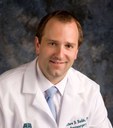 Matt Budde, Ph.D. is an Associate Professor of Neurosurgery at the Medical College of Wisconsin. He received his PhD in Neuroscience from Washington University in St. Louis in 2008. He completed his postdoctoral training at the National Institutes of Health in Bethesda, MD and was a recipient of the Fellows Award for Research Excellence in 2011.
Matt Budde, Ph.D. is an Associate Professor of Neurosurgery at the Medical College of Wisconsin. He received his PhD in Neuroscience from Washington University in St. Louis in 2008. He completed his postdoctoral training at the National Institutes of Health in Bethesda, MD and was a recipient of the Fellows Award for Research Excellence in 2011.
 MJ Negahdar, Ph.D., MBA is an MRI scientist and manager of MRI Research Facility at the University of Louisville with over 60% dedicated time to research activities. He has broad knowledge on medical imaging and image processing in human imaging in addition to large and small animal models. With over 10 years experience in interdisciplinary collaborations with departments of Engineering, Radiology, Neurosurgery, and Cardiology he also has designed and developed CSF and arterial flow analysis softward (MRI Flow Tool) which is currently in use by the Department of Neurosurgery and Radiology at the University of Louisville. He designs and analyzes many MRI sequences in SCI related projects with Boakye Labs including DTI, CSF cine flow and myelogram data.
MJ Negahdar, Ph.D., MBA is an MRI scientist and manager of MRI Research Facility at the University of Louisville with over 60% dedicated time to research activities. He has broad knowledge on medical imaging and image processing in human imaging in addition to large and small animal models. With over 10 years experience in interdisciplinary collaborations with departments of Engineering, Radiology, Neurosurgery, and Cardiology he also has designed and developed CSF and arterial flow analysis softward (MRI Flow Tool) which is currently in use by the Department of Neurosurgery and Radiology at the University of Louisville. He designs and analyzes many MRI sequences in SCI related projects with Boakye Labs including DTI, CSF cine flow and myelogram data.
Electrophysiology
Manpreet Chopra has been involved in an Epidural stimulation project for 11 years. She earned her Medicine and Surgery degree in Naturopathy from India and earned certifications in Biotechnology and IONM. She is currently working as Clinical Operations Manager for the Epidural Lab at KSCIRC under the supervision of Dr. Claudia Angeli. She is also working on the Porcine project with Dr. Maxwell Boakye for assessing the electrophysiological changes before and after the spinal cord injury.
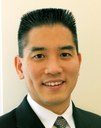 Brian Kwon, M.D., F.R.C.S.C, Ph.D. is a surgeon-scientist with advanced training in spine surgery and also a PhD in neuroscience. He is a Professor in the UBC Department of Orthopaedics. As an attending orthopaedic spine surgeon at Vancouver General Hospital his practice is focused on the management of adult spine trauma, spinal cord injuries, and non-traumatic conditions such as spine infection, deformity, and degeneration. As a neuroscientist and Principal Investigator at ICORD, Dr. Kwon runs an active basic/translational research laboratory. Dr. Kwon is currently also serving as the Associate Director, Clinical Research, for ICORD, and is the Associate Scientific Director of the Rick Hansen Institute.
Brian Kwon, M.D., F.R.C.S.C, Ph.D. is a surgeon-scientist with advanced training in spine surgery and also a PhD in neuroscience. He is a Professor in the UBC Department of Orthopaedics. As an attending orthopaedic spine surgeon at Vancouver General Hospital his practice is focused on the management of adult spine trauma, spinal cord injuries, and non-traumatic conditions such as spine infection, deformity, and degeneration. As a neuroscientist and Principal Investigator at ICORD, Dr. Kwon runs an active basic/translational research laboratory. Dr. Kwon is currently also serving as the Associate Director, Clinical Research, for ICORD, and is the Associate Scientific Director of the Rick Hansen Institute.
Neuromodulation
 Susan Harkema, Ph.D. is a graduate of Michigan State University where she earned her B.S. and Ph.D. in physiology and completed a postdoctoral fellowship in neurology at the University of California, Los Angeles. After joining the faculty at UCLA in 1995 as an assistant researcher, Harkema became an assistant professor in the department of neurology and the Brain Research Institute. She joined the University of Louisville's Department of Neurological Surgery and Kentucky Spinal Cord Injury Research Center as well as the Frazier Rehab Institute in 2005. Her primary research aim is to understand neural mechanisms responsible for human locomotion and the level of plasticity after neurologic injury. The primary focus is to study the plasticity of the human lumbosacral spinal cord in individuals with spinal cord injury during locomotor training.
Susan Harkema, Ph.D. is a graduate of Michigan State University where she earned her B.S. and Ph.D. in physiology and completed a postdoctoral fellowship in neurology at the University of California, Los Angeles. After joining the faculty at UCLA in 1995 as an assistant researcher, Harkema became an assistant professor in the department of neurology and the Brain Research Institute. She joined the University of Louisville's Department of Neurological Surgery and Kentucky Spinal Cord Injury Research Center as well as the Frazier Rehab Institute in 2005. Her primary research aim is to understand neural mechanisms responsible for human locomotion and the level of plasticity after neurologic injury. The primary focus is to study the plasticity of the human lumbosacral spinal cord in individuals with spinal cord injury during locomotor training.
 Claudia Angeli, Ph.D. is the Director of the Epidural Stimulation Program at KSCIRC and has been involved with epidural stimulation research since 2009 and has a primary interest in restoration of motor function. Her seminal first author publications in Brain (2014) and the New England Journal of Medicine (2018) have shown voluntary movement and overground walking, recovery once believed unattainable following those who had been diagnosed with motor complete spinal cord injury.
Claudia Angeli, Ph.D. is the Director of the Epidural Stimulation Program at KSCIRC and has been involved with epidural stimulation research since 2009 and has a primary interest in restoration of motor function. Her seminal first author publications in Brain (2014) and the New England Journal of Medicine (2018) have shown voluntary movement and overground walking, recovery once believed unattainable following those who had been diagnosed with motor complete spinal cord injury.
 Enrico Rejc, Ph.D. received his Ph.D. in Exercise Physiology, Masters and BS from University of Udine (Italy), where he also worked as research assistant. Prior to taking a position at the University of Louisville, he was also involved in research activities at the Department of Integrative Biology and Physiology, University of California, Los Angeles and at the Institute for Biophysical and Clinical Research into Human Movement, Manchester Metropolitan University (UK).
Enrico Rejc, Ph.D. received his Ph.D. in Exercise Physiology, Masters and BS from University of Udine (Italy), where he also worked as research assistant. Prior to taking a position at the University of Louisville, he was also involved in research activities at the Department of Integrative Biology and Physiology, University of California, Los Angeles and at the Institute for Biophysical and Clinical Research into Human Movement, Manchester Metropolitan University (UK).
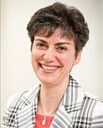 Vivian Musharwar, Ph.D. is a Professor in the Division of Physical Medicine and Rehabilitation. An engineer by training (electrical), Dr. Mushahwar obtained her Ph.D. in biomedical engineering from the University of Utah. Research in the Mushahwar lab focuses on many aspects such as the restoration of standing and walking after spinal cord injury and the detection and prevention of deep tissue pressure sores using functional electrical stimulation (FES) techniques. The Mushahwar lab is working with other groups of the Project SMART team to develop implantable devices that utilize intraspinal microstimulation (ISMS) to stimulate the “control centre” for standing and stepping in the spinal cord and thereby restore this ability after spinal cord injury. In addition, in collaboration with researchers in the Stein, Chan, and Dukelow research groups, Mushahwar’s lab is developing a garment to detect and prevent the onset of pressure sores in wheelchair and bed ridden patients.
Vivian Musharwar, Ph.D. is a Professor in the Division of Physical Medicine and Rehabilitation. An engineer by training (electrical), Dr. Mushahwar obtained her Ph.D. in biomedical engineering from the University of Utah. Research in the Mushahwar lab focuses on many aspects such as the restoration of standing and walking after spinal cord injury and the detection and prevention of deep tissue pressure sores using functional electrical stimulation (FES) techniques. The Mushahwar lab is working with other groups of the Project SMART team to develop implantable devices that utilize intraspinal microstimulation (ISMS) to stimulate the “control centre” for standing and stepping in the spinal cord and thereby restore this ability after spinal cord injury. In addition, in collaboration with researchers in the Stein, Chan, and Dukelow research groups, Mushahwar’s lab is developing a garment to detect and prevent the onset of pressure sores in wheelchair and bed ridden patients.
 Alex Ovechkin, M.D., Ph.D.- Scientific interests of Dr. Ovechkin's Lab are in the development and implementation of clinical and neurophysiological methods for use in clinical research to examine pulmonary and cardiovascular functions in disease and injury. The focus of this work is the study of the functional impairment of respiratory and cardiovascular systems after spinal cord injury and the effects of new rehabilitative strategies.
Alex Ovechkin, M.D., Ph.D.- Scientific interests of Dr. Ovechkin's Lab are in the development and implementation of clinical and neurophysiological methods for use in clinical research to examine pulmonary and cardiovascular functions in disease and injury. The focus of this work is the study of the functional impairment of respiratory and cardiovascular systems after spinal cord injury and the effects of new rehabilitative strategies.
Gastrointestinal System
 Thomas Abell, M.D. is the Arthur M. Schoen MD Chair in Gastroenterology at the University of Louisville, where he has been since 2012. Originally trained in Primary Care, Dr. Abell is also trained in Internal Medicine, Gastroenterology, GI Motility, and several related areas. Dr. Abell has been instrumental in setting up GI Motility Clinics at Universities in the Mid-South (Tennessee, Arkansas, and Mississippi) and now at the University of Louisville, Kentucky, for over 30 years. While interested in all types of GI motility disorders, a special emphasis has been on the gastroparesis syndromes, as an original member of the NIH Gastroparesis Clinical Research Consotium. His team in Memphis, TN pioneered the current technique used for GI Neuromodulation of the upper GI tract and that has been a focus in Louisville. Dr. Abell has a long interest in GI manifestations of neurologic disease in general and in spinal cord injury in particular.
Thomas Abell, M.D. is the Arthur M. Schoen MD Chair in Gastroenterology at the University of Louisville, where he has been since 2012. Originally trained in Primary Care, Dr. Abell is also trained in Internal Medicine, Gastroenterology, GI Motility, and several related areas. Dr. Abell has been instrumental in setting up GI Motility Clinics at Universities in the Mid-South (Tennessee, Arkansas, and Mississippi) and now at the University of Louisville, Kentucky, for over 30 years. While interested in all types of GI motility disorders, a special emphasis has been on the gastroparesis syndromes, as an original member of the NIH Gastroparesis Clinical Research Consotium. His team in Memphis, TN pioneered the current technique used for GI Neuromodulation of the upper GI tract and that has been a focus in Louisville. Dr. Abell has a long interest in GI manifestations of neurologic disease in general and in spinal cord injury in particular.
Inflammation and Metabolism and Microbiome
 Ona Bloom, Ph.D. is director of the Laboratory of Spinal Cord Injury Research and a professor at the Feinstein Institutes for Medical Research. She is jointly appointed as professor of Physical Medicine & Rehabilitation and of Molecular Medicine at the Donald and Barbara Zucker School of Medicine at Hofstra/Northwell. Dr. Bloom also serves as the Director of Research for the Department of Physical Medicine and Rehabilitation.
Ona Bloom, Ph.D. is director of the Laboratory of Spinal Cord Injury Research and a professor at the Feinstein Institutes for Medical Research. She is jointly appointed as professor of Physical Medicine & Rehabilitation and of Molecular Medicine at the Donald and Barbara Zucker School of Medicine at Hofstra/Northwell. Dr. Bloom also serves as the Director of Research for the Department of Physical Medicine and Rehabilitation.
Enrico Rejc, Ph.D. - listed above.
 Sriprakash Mokshagundam, M.D. is a Professor of Medicine and Chief of the Division of Endocrinology, Metabolism & Diabetes at the University of Louisville. Dr. Mokshagundam is also the Chief of Endocrinology at the Robley Rex Veterans Affairs Medical Center in Louisville, Kentucky.
Sriprakash Mokshagundam, M.D. is a Professor of Medicine and Chief of the Division of Endocrinology, Metabolism & Diabetes at the University of Louisville. Dr. Mokshagundam is also the Chief of Endocrinology at the Robley Rex Veterans Affairs Medical Center in Louisville, Kentucky.
Neurohistology
Dena Howland, Ph.D. - listed above.
Veterinary Surgery Program
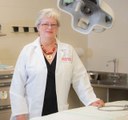 Leslie Sherwood, DVM is an Associate Professor in the School of Medicine. She is the Assistant Vice President for Research Services, Director of the Comparative Medicine Research Unit and the University of Louisville Attending Veterinarian. Dr. Sherwood received a BS in Animal Science from the University of Kentucky in 1990, and a Doctorate in Veterinary Medicine from Auburn University in 1993. Dr. Sherwood’s research focus is on the development of large animal models of disease, including pain assessment and alleviation. Dr. Sherwood has responsibility for oversight and direction of the daily husbandry and veterinary care for animals in the University of Louisville biomedical research program. Teaching and training animal care and research staff in humane care and treatment of animals, regulatory requirements, pain assessment, anesthesia, analgesia and compliance are additional areas of her programmatic responsibilities. Dr. Sherwood is a standing member of the University of Louisville’s Institutional Animal Care and Use Committee (IACUC), an ad hoc consultant for the Association for the Assessment and Accreditation of Laboratory Animal Care, International (AAALACi). She is also an active member of the Kentucky Branch and District 5 of the American Association for Laboratory Animal Science.
Leslie Sherwood, DVM is an Associate Professor in the School of Medicine. She is the Assistant Vice President for Research Services, Director of the Comparative Medicine Research Unit and the University of Louisville Attending Veterinarian. Dr. Sherwood received a BS in Animal Science from the University of Kentucky in 1990, and a Doctorate in Veterinary Medicine from Auburn University in 1993. Dr. Sherwood’s research focus is on the development of large animal models of disease, including pain assessment and alleviation. Dr. Sherwood has responsibility for oversight and direction of the daily husbandry and veterinary care for animals in the University of Louisville biomedical research program. Teaching and training animal care and research staff in humane care and treatment of animals, regulatory requirements, pain assessment, anesthesia, analgesia and compliance are additional areas of her programmatic responsibilities. Dr. Sherwood is a standing member of the University of Louisville’s Institutional Animal Care and Use Committee (IACUC), an ad hoc consultant for the Association for the Assessment and Accreditation of Laboratory Animal Care, International (AAALACi). She is also an active member of the Kentucky Branch and District 5 of the American Association for Laboratory Animal Science.
 Steven Davison , DVM joined the University of Louisville as an Assistant Professor and Clinical Veterinarian for the Research Resources Facility in November 2018. He completed his undergraduate and veterinary degrees at Mississippi State University and a Laboratory Animal Medicine Residency at the University of Florida and University of Tennessee Health Science Center. After his residency, Dr. Davison worked in small animal private practice and as a contract clinical veterinarian for the FDA’s National Center for Toxicological Research prior to joining UofL. Dr. Davison has extensive training in a number of species, including porcine surgical models. In addition to serving as veterinary surgeon for the Boakye lab, Dr. Davison also manages UofL’s Center for Biomedical Research (COBRE) in Functional Microbiomics, Inflammation and Pathogenicity Germ-Free & Gnotobiotic Mouse Facility.
Steven Davison , DVM joined the University of Louisville as an Assistant Professor and Clinical Veterinarian for the Research Resources Facility in November 2018. He completed his undergraduate and veterinary degrees at Mississippi State University and a Laboratory Animal Medicine Residency at the University of Florida and University of Tennessee Health Science Center. After his residency, Dr. Davison worked in small animal private practice and as a contract clinical veterinarian for the FDA’s National Center for Toxicological Research prior to joining UofL. Dr. Davison has extensive training in a number of species, including porcine surgical models. In addition to serving as veterinary surgeon for the Boakye lab, Dr. Davison also manages UofL’s Center for Biomedical Research (COBRE) in Functional Microbiomics, Inflammation and Pathogenicity Germ-Free & Gnotobiotic Mouse Facility.
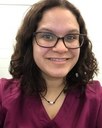 Caitlin Moorman is the lead trainer and animal handler for the porcine lab. She earned a Bachelor of Arts degree in Animal Management from the University of Louisville in December 2014. Caitlin joined the porcine lab team in August 2019 after working three years as a lab animal technician at UofL. She trains the animals using positive reinforcement, collects data, assists in surgeries, and provides supportive care for the animals post injury. Caitlin gained animal behavior and animal handling skills from previous work with a variety of species in clinical, zoological, and laboratory settings.
Caitlin Moorman is the lead trainer and animal handler for the porcine lab. She earned a Bachelor of Arts degree in Animal Management from the University of Louisville in December 2014. Caitlin joined the porcine lab team in August 2019 after working three years as a lab animal technician at UofL. She trains the animals using positive reinforcement, collects data, assists in surgeries, and provides supportive care for the animals post injury. Caitlin gained animal behavior and animal handling skills from previous work with a variety of species in clinical, zoological, and laboratory settings.
Bone
 Michael Voor, Ph.D. is an Associate Professor of Orthopaedic Surgery at the University of Lousivlle. Dr. Voor received his PhD from Tulane University in Biomedical Engineering.
Michael Voor, Ph.D. is an Associate Professor of Orthopaedic Surgery at the University of Lousivlle. Dr. Voor received his PhD from Tulane University in Biomedical Engineering.
Pain
 Jeff Petruska, Ph.D. In terms of biological principles, Dr. Petruska investigates the cellular and molecular mechanisms regulating anatomical and electrophysiological plasticity of neurons, focusing on the peripheral nervous system and spinal cord. He is particularly interested in the interaction between, and co-regulation of, the anatomical and electrophysiological properties of neurons. Dr. Petruska studies these principles in the context of spinal cord injury and the spinal pain system (particularly in the context of damage to
Jeff Petruska, Ph.D. In terms of biological principles, Dr. Petruska investigates the cellular and molecular mechanisms regulating anatomical and electrophysiological plasticity of neurons, focusing on the peripheral nervous system and spinal cord. He is particularly interested in the interaction between, and co-regulation of, the anatomical and electrophysiological properties of neurons. Dr. Petruska studies these principles in the context of spinal cord injury and the spinal pain system (particularly in the context of damage to peripheral tissue which is a common and chronic issue for the SCI population and is an etiological factor in the development of chronic pain).
Students
 Chase Knibbe, M.S., is a medical student at University of Louisville School of Medicine. His interests include improving functional outcomes after acute central nervous system injuries through the utilization of large animal models. He holds a degree in Chemistry from Western Kentucky University and a Masters of Science in Safety Pharmacology from the University of Cincinnati College of Medicine.
Chase Knibbe, M.S., is a medical student at University of Louisville School of Medicine. His interests include improving functional outcomes after acute central nervous system injuries through the utilization of large animal models. He holds a degree in Chemistry from Western Kentucky University and a Masters of Science in Safety Pharmacology from the University of Cincinnati College of Medicine.
Alumni
 Neesha Settipalle, M.D., was a research associate in the Spinal Cord Injury Lab and subsequently completed an Internal Medicine Residency from University of Louisville School of Medicine. She currently is practicing as an outpatient primary care physician at HSHS Medical Group in Springfield, IL.
Neesha Settipalle, M.D., was a research associate in the Spinal Cord Injury Lab and subsequently completed an Internal Medicine Residency from University of Louisville School of Medicine. She currently is practicing as an outpatient primary care physician at HSHS Medical Group in Springfield, IL.
 Felicia Wilkins graduated from the University of Louisville School of Medicine in 2022. One of the reasons she chose to complete her medical education at the University of Louisville was because of the robust spinal cord injury research and rehabilitation program at Frazier. She received her BA from Dartmouth College and completed a premedical postbaccalaureate program at Columbia University.
Felicia Wilkins graduated from the University of Louisville School of Medicine in 2022. One of the reasons she chose to complete her medical education at the University of Louisville was because of the robust spinal cord injury research and rehabilitation program at Frazier. She received her BA from Dartmouth College and completed a premedical postbaccalaureate program at Columbia University.
Publications
Smith AC, Angeli CA, Ugiliweneza B, Weber KA 2nd, Bert RJ, Negahdar M, Mesbah S, Boakye M, Harkema SJ, Rejc E. Spinal cord imaging markers and recovery of standing with epidural stimulation in individuals with clinically motor complete spinal cord injury. Exp Brain Res. 2022 Jan;240(1):279-288. doi: 10.1007/s00221-021-06272-9. Epub 2021 Dec 2. PMID: 34854934.
Boakye M, Ugiliweneza B, Madrigal F, Mesbah S, Ovechkin A, Angeli C, Bloom O, Wecht JW, Ditterline B, Harel NY, Kirshblum S, Forrest G, Wu S, Harkema S, Guest J. Clinical Trial Designs for Neuromodulation in Chronic Spinal Cord Injury Using Epidural Stimulation. Neuromodulation. 2021 Apr;24(3):405-415. doi: 10.1111/ner.13381. Epub 2021 Apr 1. PMID: 33794042.
Mesbah S, Ball T, Angeli C, Rejc E, Dietz N, Ugiliweneza B, Harkema S, Boakye M. Predictors of volitional motor recovery with epidural stimulation in individuals with chronic spinal cord injury. Brain. 2021 Mar 3;144(2):420-433. doi: 10.1093/brain/awaa423. PMID: 33367527.
Boakye M, Morehouse J, Ethridge J, Burke DA, Khattar NK, Kumar C, Manouchehri N, Streijger F, Reed R, Magnuson DSK, Sherwood L, Kwon BK, Howland DR. Treadmill-Based Gait Kinematics in the Yucatan Mini Pig. J Neurotrauma. 2020 Nov 1;37(21):2277-2291. doi: 10.1089/neu.2020.7050. Epub 2020 Aug 10. PMID: 32605423.
Arnold FW, Bishop S, Johnson D, Scott L, Heishman C, Oppy L, Ball T, Sharma M, Angeli C, Ferreira C, Chen Y, Harkema S, Boakye M. Root cause analysis of epidural spinal cord stimulator implant infections with resolution after implementation of an improved protocol for surgical placement. J Infect Prev. 2019 Jul;20(4):185-190. doi: 10.1177/1757177419844323. Epub 2019 May 2. PMID: 31428199; PMCID: PMC6683604.
Bert RJ, Settipalle N, Muddasani D, Tiwana E, Wellman B, Negahdar MJ, Mihlon F, Amini A, Boakye M. ECG Gating Is More Precise Than Peripheral Pulse Gating When Quantifying Spinal CSF Pulsations Using Phase Contrast Cine MRI. Acad Radiol. 2020 Apr;27(4):552-562. doi: 10.1016/j.acra.2019.06.015. Epub 2019 Jul 25. PMID: 31353089.
Bert RJ, Settipalle N, Tiwana E, Muddasani D, Nath R, Wellman B, Mihlon F, Negahdar M, Amini A, Boakye M. The relationships among spinal CSF flows, spinal cord geometry, and vascular correlations: evidence of intrathecal sources and sinks. Am J Physiol Regul Integr Comp Physiol. 2019 Sep 1;317(3):R470-R484. doi: 10.1152/ajpregu.00101.2018. Epub 2019 Jun 26. PMID: 31242020.